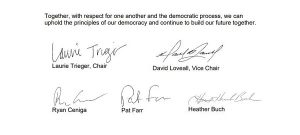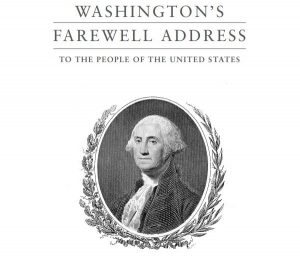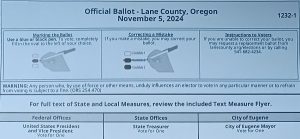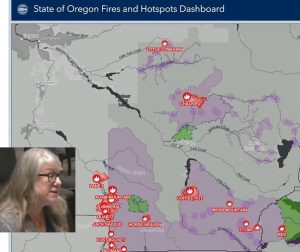Legal fireworks sales feed 19,000 each year, support youth camps and field trips
7 min read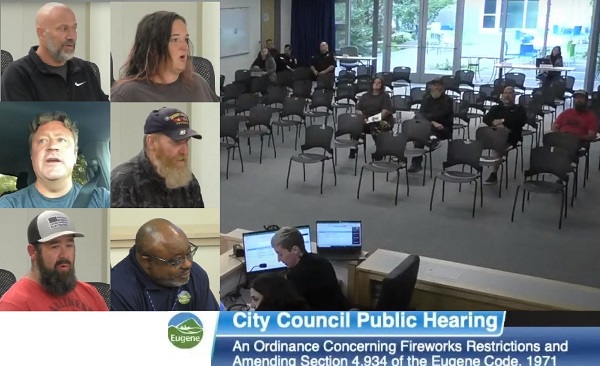
During public comment Monday evening, the Eugene City Council heard that local firework stands aren’t the problem. They help raise money for local nonprofits.
[00:00:10] Pastor Aaron Taylor: I have been selling fireworks here in this area for nonprofit groups for over 30 years, raising millions of dollars. Last year, we fed 19,000 people solely with fireworks funds. But we may not do that again because of the decision of this council. As well as children that will not go to camp, as well as the camp facility purchased with fireworks. And next year we’ll pay the last $200,000 unless we’re not able to do fireworks. Then it will be sold for another purpose. That’s exactly the reality of it. Your decisions are weighty.
[00:00:49] You’re willing to do a prohibition on something that is designated ‘safe and sane’ in our community. And it will be placed 100% on your back for breaking the backs of bands, schools, missions trips. You say, ‘Oh, well, find another fundraiser.’ Thirty years of fundraising, this is the number one fundraiser. And we have raised millions of dollars and families celebrate in the middle of their cul-de-sac, nothing’s going to get on lit on fire there.
[00:01:18] I’m happy to work with you for safety campaigns, and I’m happy to help you report all the illegal fireworks, which is what causes the problem. These little tiny fireworks and sparklers— half of which don’t make noise at all— aren’t the reason for issues. So it’s a lie. We’re making a decision off something that isn’t true.
[00:01:37] Jason Trout: My name is Jason Trout. I’m the regional manager for TNT Fireworks. I echo what Aaron is saying. As an industry, we’ve been more than willing to compromise. We have reduced the time that we’re allowed to sell or that use is allowed. We’ve also reduced where we can sell.
[00:01:58] We even brought to the city of Eugene an app that they can use to go after what the real problem is. And the real problem are illegal fireworks. Those are the ones that are causing problems.
[00:02:12] Talk to us about what we’re doing in other municipalities. Bans do not work. It’s going to force everyone that wants to celebrate the Fourth of July to go out and buy illegal fireworks.
[00:02:25] Anthony Hopper: I work with Funds For Kids, a company that for 30 years provided resource and income for many nonprofits and we were told, ‘Find other fundraisers.’ I would be interested to hear from any of you to tell me a fundraiser that in one month’s time can raise over a half a million dollars for this community and what we do.
[00:02:41] We have people making a decision without any input from an industry, without any input from the general public.
[00:02:47] You take something that is unlegislatable, you make laws and now you make criminals out of more people and an already underfunded police staff, and we’re going to help problems how?
[00:02:58] We can make things illegal all day long. But what illegal doesn’t do, what laws never have done, is educate anybody. They don’t change the heart of people. They don’t change the intentions. They just change the circumstances and the consequences. What needs to be changed isn’t a consequence. What needs to be changed is the thought processes of the people who are handling fireworks to let them know the real dangers behind the illegal ones.
[00:03:19] Punishing the mass for the crimes of a few will not solve a problem. It will grow a problem.
[00:03:24] Just like making guns illegal and making alcohol illegal has never taken away drinking and has never stopped gun crime. The areas that have done it have proven it only makes it worse.
[00:03:35] Pat Koch: Hi, I am 100% disabled, PTSD. The mortar sound of it being launched out of, those illegal ones, that is what triggers you. The mortar sounds, your big illegal fireworks. That is what affects the veterans. Not a sparkler. I’ve been shot at with machine guns. A sparkler is not going to scare me.
[00:03:57] So what I’ve done to teach myself how to control myself is, I like to volunteer with the fireworks and the sparklers. Come on, you can look at a fountain and know, wow, that’s not machine gun fire. That’s not going to kill me. I mean, it’s common sense. A mortar coming with illegal ones that are not enforced are the problems. I mean, are you going to put a checkpoint at the Washington border and check every car like you do Mexicans, at Mexico? No, you can’t. The resources aren’t there.
[00:04:26] I got two newborn grandbabies in the hospital right now, just were born. I will celebrate a Fourth of July with them. And I don’t want to have to do the loud ones, ‘cause that is going to drive me nuts with my PTSD. I can’t handle it. But I will celebrate with those grandkids. Thank you.
[00:04:43] Shellee Koch: Hi, my name’s Shellee. I also volunteer with the fireworks, but I also run the food ministry, which benefits from all the donations that we get from the proceeds. We feed over 100 families a week and without support, I don’t know how that would be possible because we have to have a building. We have to have a place to be able to serve the families that we serve.
[00:05:05] Also had a dog, she’s passed away, but what scared her was the M-80s that would get thrown, which are illegal and they come from Washington. Those loud booms are what would petrify my husky, not—I could light a regular fountain, a small fountain of sparkler— none of that did it. It’s the loud booms that come from M-80s, the bottle rockets, the sky ones are what scared her. And so any dog that I’ve had, it’s been those loud noises from the illegal ones. But we haven’t tried to minimize the illegal ones coming into our cities.
[00:05:38] We’re just trying to focus on the legal ones that don’t go no more than six feet off the ground. And when we do sell them, we do tell them, we give them a flyer saying, ‘These are safety precautions. Don’t light it around trees. Don’t light it around other things. Keep it away from people.’
[00:05:54] Even with the sparklers, we have long ones, we have short ones and we tell them if they’re smaller kids, ‘Don’t get them the short ones, we have the six-foot sparklers that they can hold and the kids won’t get burned with it.’ So there is safety precautions that we do put in place and we let people know. We recommend people have a bucket of water: ‘After you light it off, stick it in a bucket of water.’
[00:06:14] I cook at those camps that we have underprivileged kids come to, because we do these things. We have a lot of foster kids that come in that can’t afford to pay. We have a lot of low-income kids that can’t afford to come to these camps that they get to go on inner tubing, they get to go to Oaks Park, all of these things they get to do because of fireworks, because we can support and we can say, ‘We will pay for your tuition to come to camp,’ so they can get all that.
[00:06:43] Thomas Newman: Hi. I don’t think everything should be about economics when it comes to fireworks. They’re not a necessity. I believe we can have fireworks at fireworks shows and designated places to have personal fireworks at. I see a lot of speakers having a conflict of interest between their own personal businesses, the fireworks industries that the fireworks they sell, and the wellbeing and health and benefit and environment of Eugene and its citizens.
[00:07:16] Cigarettes don’t send cinders high up in the trees on top of people’s houses, even the legal ones sometimes go way up high and land tops of people’s combustible roofs, asphalt roofs. And also, they could send up cinders up into trees. I just don’t think it’s the right thing for Eugene.
[00:07:38] Councilor Greg Evans: So full confession, I have bought fireworks at a number of Pastor Taylor’s different outlets in Bethel and other parts of the city. And they’re not illegal. The problem is the illegal fireworks that are banned in Oregon coming across the border from Washington. I don’t know how to deal with that. And I don’t think that a municipal ordinance banning all fireworks is necessarily going to address that issue.
[00:08:10] But people are going to use them anyway, whether we pass an ordinance or not, and ordinances against fireworks in this community and most any other community are virtually unenforceable. We don’t have the police power. We don’t have the manpower, the fire department isn’t going to go arrest people or give out tickets.
[00:08:30] There has to be other communities that have dealt with this in a more proactive way so that we don’t take away much needed revenue for a lot of good causes that are out there. I’m in favor of us backing up and trying to work with those people who have been in this business for years, who have raised money for a lot of great causes, to find middle ground and a way forward…
[00:08:59] If we are going to do any kind of regulation, I would be open to looking at model ordinances from other cities to see how we can find middle ground.
[00:09:11] John Q: Local fundraisers ask the city to reconsider its proposal to ban fireworks. They say legal fireworks feed a hundred families a week and support a youth camp and field trips.
